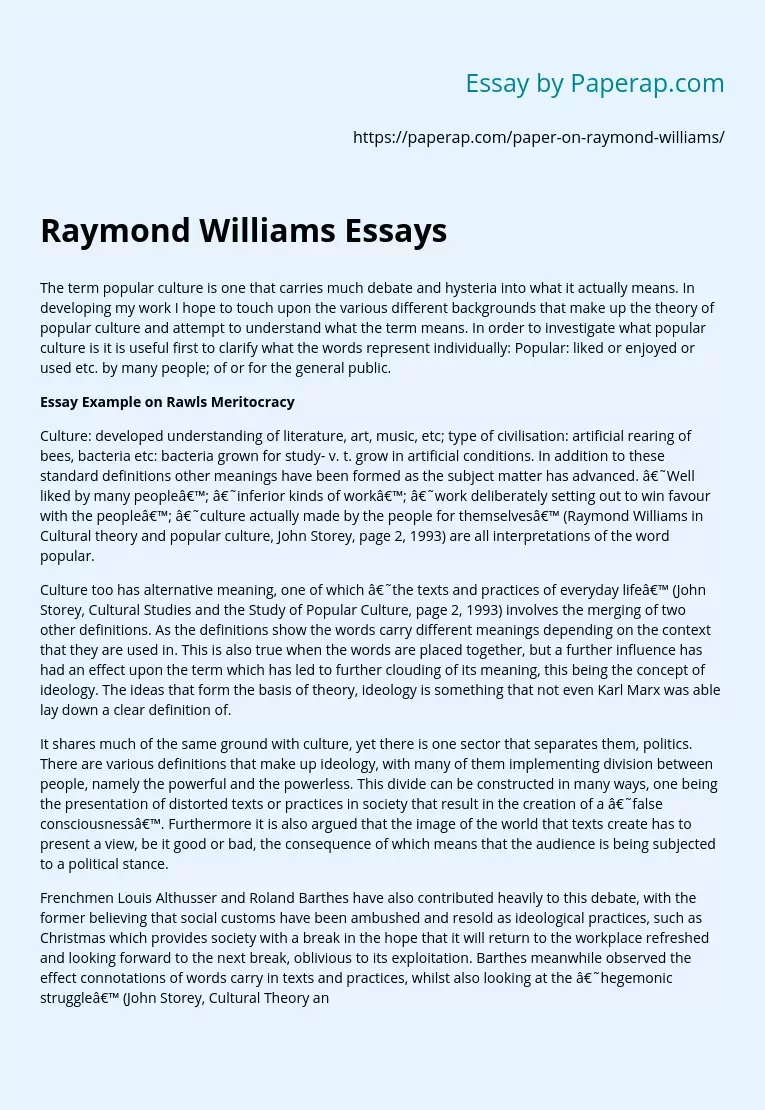Raymond Williams Essays
The term popular culture is one that carries much debate and hysteria into what it actually means. In developing my work I hope to touch upon the various different backgrounds that make up the theory of popular culture and attempt to understand what the term means. In order to investigate what popular culture is it is useful first to clarify what the words represent individually: Popular: liked or enjoyed or used etc. by many people; of or for the general public.
Essay Example on Rawls Meritocracy
Culture: developed understanding of literature, art, music, etc; type of civilisation: artificial rearing of bees, bacteria etc: bacteria grown for study- v. t. grow in artificial conditions. In addition to these standard definitions other meanings have been formed as the subject matter has advanced. ‘Well liked by many people’; ‘inferior kinds of work’; ‘work deliberately setting out to win favour with the people’; ‘culture actually made by the people for themselves’ (Raymond Williams in Cultural theory and popular culture, John Storey, page 2, 1993) are all interpretations of the word popular.
Culture too has alternative meaning, one of which ‘the texts and practices of everyday life’ (John Storey, Cultural Studies and the Study of Popular Culture, page 2, 1993) involves the merging of two other definitions. As the definitions show the words carry different meanings depending on the context that they are used in. This is also true when the words are placed together, but a further influence has had an effect upon the term which has led to further clouding of its meaning, this being the concept of ideology.
The ideas that form the basis of theory, ideology is something that not even Karl Marx was able lay down a clear definition of.
It shares much of the same ground with culture, yet there is one sector that separates them, politics. There are various definitions that make up ideology, with many of them implementing division between people, namely the powerful and the powerless. This divide can be constructed in many ways, one being the presentation of distorted texts or practices in society that result in the creation of a ‘false consciousness’. Furthermore it is also argued that the image of the world that texts create has to present a view, be it good or bad, the consequence of which means that the audience is being subjected to a political stance.
Frenchmen Louis Althusser and Roland Barthes have also contributed heavily to this debate, with the former believing that social customs have been ambushed and resold as ideological practices, such as Christmas which provides society with a break in the hope that it will return to the workplace refreshed and looking forward to the next break, oblivious to its exploitation. Barthes meanwhile observed the effect connotations of words carry in texts and practices, whilst also looking at the ‘hegemonic struggle’ (John Storey, Cultural Theory and Popular Culture, page 6, 1993) to control and create connotations by the powerful.
And so it is that through a combination of culture and ideology the term popular culture has developed. It is at this point where conflict arises though over what the term really does mean, which has resulted in the creation of a number of theories. Culture that is widely consumed or liked, which can be measured through investigation of sales is one thought, but this then leads to further debate over what figure is set as popular.
There is also the idea that whatever is left from high culture becomes its popular counterpart, but this then leads to conflict over what high culture is as certain texts or practices have at one point been part of both. An example of this being Shakespeare’s plays, which at the time of writing would have been seen as popular culture, but are now seen as high culture. The notion that it is ‘mass culture’, which then leads onto commercialisation and the ‘Americanization’ theory.
Raymond Williams Essays. (2019, Nov 27). Retrieved from https://paperap.com/paper-on-raymond-williams/

